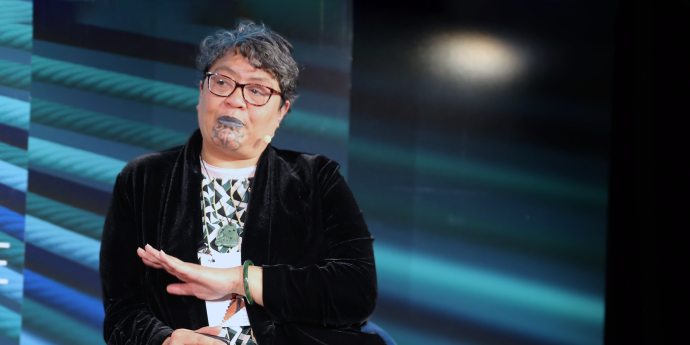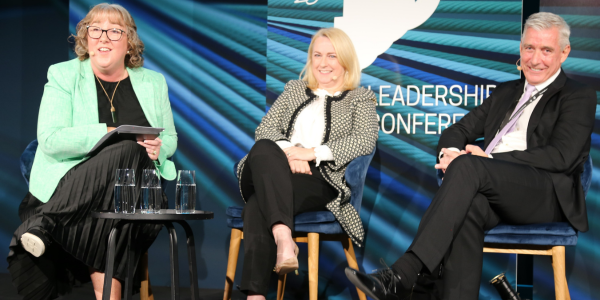Elon Musk’s drug use back on the agenda for the Tesla board
Find out how Elon Musk’s reported drug use has Tesla board members facing a familiar quandary: deciding what, if anything, to do about the…

It was a worm-lover’s delight as directors gathered at 7.15am for a power breakfast on day two of the IoD Leadership Conference. The early birds could choose one of three panel discussions that explored environmental, social and governance issues (ESG) respectively.
When the conference proper kicked off, early rising was again noted, with Dame Therese Walsh CFInstD revealing she is not surprised to receive texts from Greg Foran before 6am.
Walsh and Foran opened up about their relationship as chair (Walsh) and CEO (Foran) of Air New Zealand and how that relationship evolved when the pandemic grounded the entire business.
In a good-humoured conversation facilitated by IoD CEO Kirsten (KP) Patterson CMInstD, Foran noted his first task was to shut the airline down. “I have looked at my contract closely, and that wasn’t in there.”
“It was under other duties as required,” replied Dame Therese.
The main takeaways from the session were that the relationship between the chair and the CEO is critical for organisational success, particularly in a crisis. That relationship has to be underpinned by transparency and trust – which the pair characterised and saying what you will do, then delivering.

KP CMInstD, Dame Therese Walsh CFInstD and Greg Foran
They advised chairs to ensure the relationship has a “conflict resolution mode” because disagreement is natural. And they warned about becoming a “board of two”, noting it is the full board that makes decisions, not simply the CEO and chair pairing.
The session was enthusiastically received with a spontaneous – solo – round of applause breaking out in the middle and directors literally jumping out of their seats at the end. Probably because Dame Therese had brought along two premium economy return tickets to New York for the person who “enjoyed our presentation the most”. Clever!
Breakout sessions followed. Conflict in the Boardroom with Carol Scholes CMInstD and Ian Fitzgerald CFInstD suggested conflict often reflects unaddressed board member discomfort with others’ behaviour. Boards should collectively and explicitly set expectations about how they will operate successfully. That means agreeing shared ethics and values and putting place policies (including a code of conduct) to set up directors for success.
Digital Download brought experts together to comment on recent developments in technology and software. Aliesha Staples MInstD, Kriv Naicker, Bryan Ventura, Mike O'Donnell MInstD, Megan Tapsell MInstD formed a formidable panel united by an understanding that technology is impacting industries much more quickly than people tend to realise.
The opportunities and risks of artificial intelligence (AI) were cleverly demonstrated by O’Donnell, who displayed deepfake photos of the Leadership Conference created in graphics program Dall-E. While the attendees were all fake, the photos looked entirely authentic – except the one of a CEO Barbie doll, a clear example of how AI can sometimes get it wrong.
Australian director Ann Sherry AO urged boards to anticipate risk, not simply manage it. She described this as a lesson hard-learned on the back of an array of failures in the governance community.
These include the banking industry ethical collapses uncovered by the Hayne Report, regulator ASIC recently undertaking its first successful action against greenwashing, and legislative efforts to force companies to proactively address sexual harassment and bullying in the workplace.
Bullying complaints and harassment complaints are key indicators of problems in organisational culture and boards need to ask the right questions, and make sure they get the data, she said.
Cyber and tech is another area directors need to understand or run the risk in their organisations, she said, going on to suggest “the hackers are more organised than we are”.
Health then took centre stage with Tipa Mahuta, chair of Te Aka Whai Ora the Māori Health Authority and Vanessa Stoddart CMInstD, a director of Te Whatu Ora Health New Zealand, in conversation with Ross Buckley CMInstD.
Stoddart described an unusual governance environment at Te Whatu Ora: strategy is not the board’s main focus, with much of that set in advance by legislation; and being a national body that replaces 20 District Health Boards means the organisation is not internally aligned. This complexity means board packs are sometimes in excess of 1,000 pages.
Te Aka Whai Ora has been created in the wake of the Waitangi Tribunal finding the Crown to be in breach of the Treaty of Waitangi by failing to address persistent Māori health inequities. Mahuta describe the organisation as acting in partnership with Te Whatu Ora while presenting a new perspective.
Stoddart added that working on long-term reform has to be balanced with immediate concerns around “winter, waitlists and workforce”. One of the most difficult parts of her board role was coping with the sad implications for real people of not being able to “do it all”, she said.
The day closed with Rio Tinto Chair Dominic Barton offering a series of short observations on the business environment.
The head of the world’s second-largest mining corporation started with climate change, a disruption that is already affecting Rio Tinto coal interests in Australia. Climate change will catalyse the largest allocation of capital in human history, he said. In other words that climate action and adaptation is going to be very expensive.
He urged boards to stop living in the 1990s and accept the world centre of economic power today is Asia, not the US.
Alongside that, Barton feels a war over Taiwan is highly unlikely – except by accident, given how much military activity takes place in the region. The US and China remain economically intertwined, despite political rhetoric sometimes becoming heated, he said.
Barton feels it is important to realise that technology is advancing relentlessly, and he meant more than just digital technology. For example, new materials are being produced that may displace the materials we use now in a few years, he said.
From his perspective atop a multinational, he thinks globalisation will continue and income inequality is going to get worse – although the two are not necessarily related.
With reference to scandals his own company has been involved in, he highlighted the importance of maintaining your social licence to operate.
Continuing in the people space, he urged a focus on talent: “He, or she, who has the most talent is going to win.”
And that’s a wrap. See you next year in Christchurch.
Day two of the IoD Leadership Conference also featured presentations and breakout sessions by Abby Foote CFInstD, Dean Bracewell, Rob Hamilton, Tania Te Rangingangana Simpson CFInstD, Jackie Lloyd CFInstD, Craig Stobo CFInstD, Dr Helen Anderson, QSO, CFInstD, Patrick Strange CFInstD, Traci Houpapa CFInstD, Julia Hoare CMInstD, Mark Verbiest CFInstD, Phil Veal MInstD, Suse Reynolds MInstD, Miranda Burdon, Catherine Savage CFInstD, and Ant Howard CFInstD.